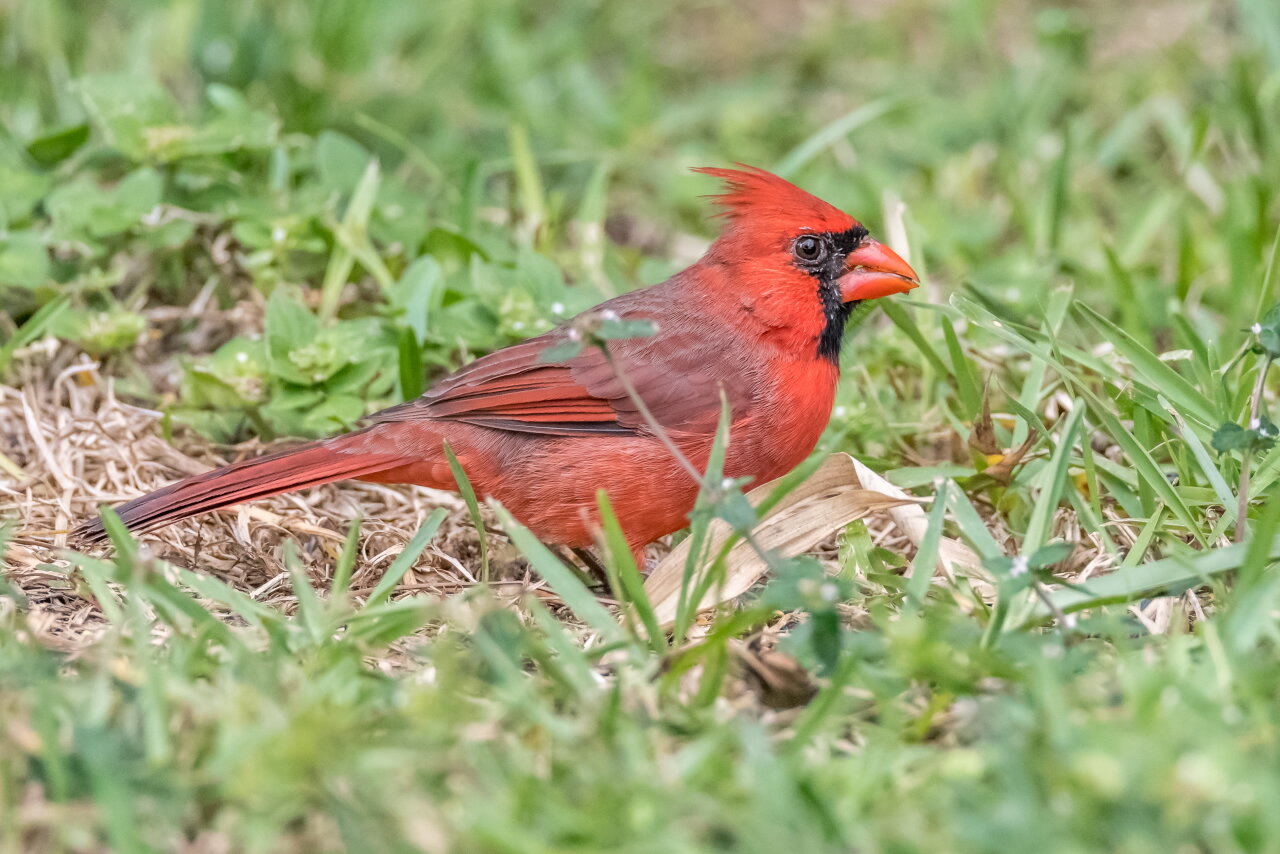Headline news: “Rare Yellow Cardinal Spotted in Port St Lucie.” It was Tuesday and Jewel said, “Hart, you have got to go and get photos of that bird!” Right! Now I almost always do everything that Jewel tells me to, and to be honest, I really liked that idea, but saying and doing are very often worlds apart. In addition, the woman reporting the bird made it clear that she did not want to divulge the location or to have large crowds in her neighborhood.
Serendipitously, the next day, Wednesday, the President of St Lucie Audubon received an email from another Port St Lucie resident, along with a cell phone video of the bird, inviting a photographer from the Society to come document the sighting. Lucky me, a couple of emails and phone calls later and there I was shortly after 7:30 Thursday morning looking at the bird through the resident’s glass back door, but in very dark unsatisfactory photographic conditions. Though I stayed until well after 11 a.m., searching for “Sunny,” so named by the original resident reporting the sighting, he only made one more quick appearance, flying through the yard with a regular male Cardinal in hot pursuit. Unfortunately, no photographs of that!
I returned shortly after 4 p.m. and after only a short wait Sunny reappeared and very briefly, for only a few seconds, posed on a post in the back yard (photo 1 and at top of column) before flying to the bird feeder that served to attract him to the yard. During the five or so minutes he remained feeding in the yard he flew to the ground once (photo 2) where he gave me the opportunity to photographically compare him to a normal red Northern Cardinal (photo 3) in approximately the same circumstances. And, of course, there were also female Cardinals (photo 4) in the area for additional comparison purposes.
While I spent about six hours waiting for Sunny to show up for a total of less than five minutes, a circumstance not at all unusual in rare bird chases, time flew by. I was in a birder’s paradise. The resident’s yard was planted with beautiful bird friendly plants, flowers and trees and there was a tremendous amount of bird activity. An uncommon to rare in Florida, Clay-colored Sparrow (photo 5) hung out in the same flowering bush that a female Ruby-throated Hummingbird (photo 6) frequented.
A huge Poinciana tree harbored White-eyed Vireo (photo 7), Tennessee Warbler (photo 8), and Northern Parula (photo 9), as well as the more common Blue-gray Gnatcatcher, and ubiquitous Palm Warbler. The last two species I saw in the evening just before I left were a Yellow-throated Vireo (photo 10) and a reminder to look everywhere when searching for birds, even the rain spout just above your head, Yellow-throated Warbler (photo 11). It was a truly exhilarating day.
So, why do one in a million red Northern Cardinals turn up yellow? There are apparently two theories: first and foremost, the bird is believed to have a rare genetic mutation that prevents the red coloration to develop from the food the bird eats. This mutation is different from albinism (which appears in many bird and mammal species, causing completely white coloration with unique pink eyes), or leucism (which also appears in many bird and mammal species, but is only a partial white coloration with regular colored eyes); the second, less prominent theory suggests the bird has a diet deficiency or environmental stressor which has caused the pigment change from red to yellow. Either way the bird can mate normally, raise young, and live a full and productive life. Interestingly, there is a South American bird species named the Yellow Cardinal. However, it is not related to our Northern Cardinal as it is in the tanager-finch family of birds.
Sunny has created quite a stir here in St Lucie County and the local paper on Saturday, four days after the bird was first reported, featured an editorial remarking on how the bird has brought us “…unity in these politically divided times…” That’s quite an accomplishment for a bird, even one as unique as Sunny. It does make one wonder whether there might be some kind of mutation we should search for in politicians that might bring similar unity into our government.
Of course, Sunny is one in a million, so I guess we would have to search for a similar one in a million politician, but then how would we ever recognize him or her? What color would a politician have to be to stand out like Sunny? Do you think purple would work?
(Click thumbnails below for larger versions. Other links below photos.)
For local news reports about Sunny, see: www.tcpalm.com/story/news/local/indian-river-county/2019/10/17/sunny-yellow-northern-cardinal-first-confirmed-sighting-florida/3996613002/; on cbs12.com/news/local/rare-yellow-cardinal-spotted-in-port-st-lucie; opinion column, 10-19-2019: www.tcpalm.com/story/opinion/editorials/2019/10/17/sunny-yellow-cardinal-bright-spot-these-divided-times/4009011002/.
Why is this Cardinal yellow: www.audubon.org/news/why-northern-cardinal-yellow.
South America’s Yellow Cardinal: neotropical.birds.cornell.edu/Species-Account/nb/species/yelcar1/overview











